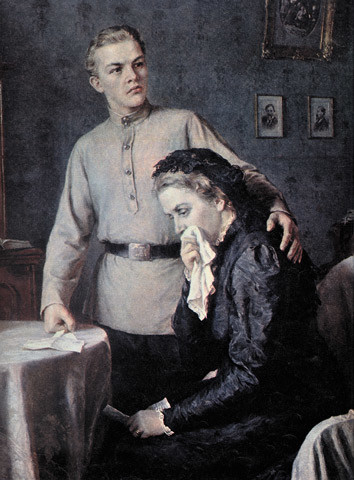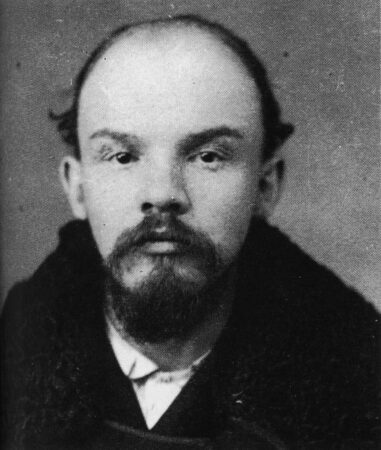
Vladimir Lenin was the leader of the Bolshevik movement, the first ruler of Soviet Russia and the dominant figure of the Russian Revolution. Lenin was born Vladimir Ilyich Ulyanov in the town of Simbirsk in 1870. The Ulyanovs were of mixed ethnic heritage, including Russian, German, Swedish and Jewish strains. Only a generation before the Ulyanovs had been lowly serfs but Lenin’s father obtained a university education, began working as a teacher and rose to become a schools inspector. Ulyanov encouraged free thinking and political discussion in the family home. Their humble background provided the Ulyanovs with empathy with Russia’s peasant and working classes; they were also politically informed and liberal-minded. In her memoirs, Lenin’s sister later recalled the family home filled with passionate discussion and debates about the situation in Russia.
In the autumn of 1887, Lenin entered Kazan University to stay law, thanks in part to a written reference from his former headmaster, the father of Alexander Kerensky. It was at university that Lenin became involved in radical Marxist groups. Both the university and the local Okhrana soon identified him as a ‘person of interest’, and within weeks of commencing his studies, Lenin was expelled. He managed to complete his studies independently, qualifying as a lawyer in 1891 – but he would practice very little, instead devoting most of his time to political activism.

As he entered adulthood, Lenin became obsessive about socialism and revolution. He read voraciously, consuming books about philosophy and socialist theory, political propaganda, reports from or about revolutionary groups around the world. When he wasn’t reading, Lenin was writing or speaking in workers’ circles or at underground meetings. In the early 1890s, he formed an alliance with Julius Martov, the future leader of the Menshevik faction; he also met and married a female socialist named Nadezhda Krupskaya. These activities made Lenin a wanted man: for much of this period he lived and worked under assumed names, and sometimes in disguise. He was eventually captured in 1895 and sentenced to three years’ isolation in Siberia. In 1900 he began another period of exile, this time in several cities of western Europe. It was during this period that he adopted the codename ‘Lenin’, possibly a derivation of the Lena River in Siberia.
“As difficult as it is to speculate on any one individual’s sense of self, there are few aspects of Lenin’s personality more apparent than his confidence in his own ideas and determination to communicate them to others with the full force of their power and clarity. He, and only he would forge the true path to socialism by means of his teachings, his directives, his constant supervision and his personal example… This was far from a modest projection, and in fact, provided the cornerstone for the cult that followed his death.”
Nina Tumarkin, historian
This ideal was effectively formed in Lenin’s image. He lived an austere existence with few creature comforts; his only interests were socialism and revolution – broken by occasional ice-skating, chess or Beethoven. Lenin was not just dedicated to the theory of revolution: he also took an interest in the physical or logistic aspects. According to Orlando Figes, the Bolshevik leader penned instruction guides for bomb use and bank robbery; he wore leather and did weights to convey the impression of strength and masculinity.
1. Vladimir Lenin, born Ulyanov, was the intellectual and political leader of the Bolsheviks and the early Soviet Union.
2. Born to a politically informed and liberal family, Lenin’s brother was executed for plotting against the tsar.
3. The young Lenin became involved in radical student groups and eventually joined the Marxist SDs.
4. He believed that socialist revolutionary parties should be small, run only by ‘professional revolutionaries’.
5. Lenin’s ideas led to the formation of the Bolshevik faction of the SDs, which became their own party and challenged the Provisional Government for control of Russia in 1917.
© Alpha History 2018. Content on this page may not be republished or distributed without permission. For more information please refer to our Terms of Use.
This page was written by Jennifer Llewellyn, John Rae and Steve Thompson. To reference this page, use the following citation:
J. Llewellyn et al, “Vladimir Lenin” at Alpha History, https://alphahistory.com/russianrevolution/vladimir-lenin/, 2018, accessed [date of last access].

